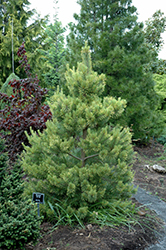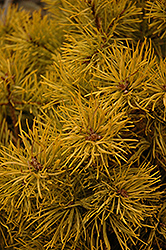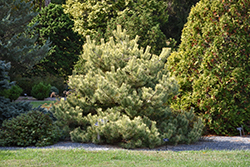It's all about ...
plants

Gold Coin Scotch Pine
Pinus sylvestris 'Gold Coin'
Height: 20 feet
Spread: 15 feet
Sunlight:
![]()
Hardiness Zone: 3a
Other Names: Scots Pine
Description:
A wonderful compact selection that grows very slowly and irregular in shape; showy foliage emerges yellow and matures to a lime green until fall and winter when it takes on a lovely deep golden hue; a perfect ornamental accent in the landscape
Ornamental Features
Gold Coin Scotch Pine is primarily valued in the landscape for its ornamental globe-shaped form. It has attractive chartreuse evergreen foliage which emerges yellow in spring. The needles are highly ornamental and turn an outstanding gold in the fall, which persists throughout the winter. The shaggy orange bark is extremely showy and adds significant winter interest.
Landscape Attributes
Gold Coin Scotch Pine is a multi-stemmed evergreen tree with a more or less rounded form. Its average texture blends into the landscape, but can be balanced by one or two finer or coarser trees or shrubs for an effective composition.
This is a relatively low maintenance tree. When pruning is necessary, it is recommended to only trim back the new growth of the current season, other than to remove any dieback. Deer don't particularly care for this plant and will usually leave it alone in favor of tastier treats. It has no significant negative characteristics.
Gold Coin Scotch Pine is recommended for the following landscape applications;
- Accent
- Hedges/Screening
- General Garden Use
Planting & Growing
Gold Coin Scotch Pine will grow to be about 20 feet tall at maturity, with a spread of 15 feet. It has a low canopy with a typical clearance of 1 foot from the ground, and is suitable for planting under power lines. It grows at a medium rate, and under ideal conditions can be expected to live for 60 years or more.
This tree should only be grown in full sunlight. It prefers dry to average moisture levels with very well-drained soil, and will often die in standing water. It is considered to be drought-tolerant, and thus makes an ideal choice for xeriscaping or the moisture-conserving landscape. It is not particular as to soil type or pH. It is highly tolerant of urban pollution and will even thrive in inner city environments. This is a selected variety of a species not originally from North America.


